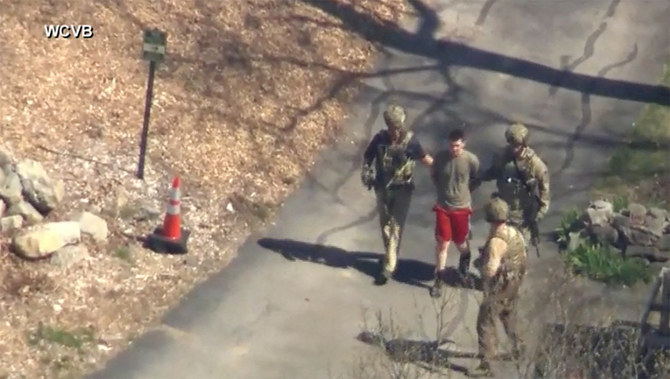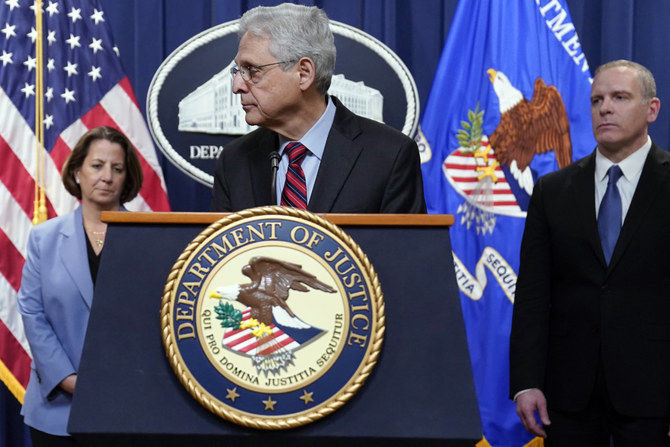WASHINGTON: A Massachusetts Air National Guard member was arrested Thursday in connection with the disclosure of highly classified military documents about the Ukraine war and other top national security issues, an alarming breach that has raised fresh questions about America’s ability to safeguard its most sensitive secrets.
The guardsman, an IT specialist identified as 21-year-old Jack Teixeira, was taken into custody without incident after FBI officers converged on his Massachusetts home. Attorney General Merrick Garland said he is to be charged with removing or transmitting classified national defense information, a crime under the Espionage Act.
Garland did not reveal a possible motive, but accounts of those in the online private chat group where the documents were disclosed have depicted Teixeira as motivated more by bravado than ideology.
While Thursday’s arrest was a pivotal moment in an investigation into the highest-profile intelligence leak in years, the military and Justice Department were still scrutinizing how sensitive government secrets shared in a chat room ended up circulating around the world. The emergence of Teixeira as a primary suspect is bound to raise questions about how such a profound breach, one that the Pentagon termed a “very serious risk to national security,” could have been caused by such a young, low-ranking service member.
“We entrust our members with a lot of responsibility at a very early age. Think about a young combat platoon sergeant, and the responsibility and trust that we put into those individuals to lead troops into combat,” said Brig. Gen. Patrick Ryder, a Pentagon spokesman.
Teixeira was a “cyber transport systems specialist,” essentially an IT specialist responsible for military communications networks, including their cabling and hubs. In that role Teixeira would have had a higher level of security clearance because he would have also been tasked with responsibility for ensuring protection for the networks, a defense official told the Associated Press, speaking on the condition of anonymity to discuss sensitive matters.
Hours after the arrest, Rep. Mike Turner, the Republican chairman of the House Intelligence Committee, issued a statement pledging to “examine why this happened, why it went unnoticed for weeks, and how to prevent future leaks.”
Teixeira, who was wearing a T-shirt and shorts at the time heavily armed tactical agents took him into custody, is due to have his initial court appearance in Massachusetts on Friday. He could also face charges in a military court.
It was not immediately clear if he had a lawyer who could speak on his behalf, and a phone message left at a number believed to belong to his mother was not returned.
The Biden administration has scrambled to contain the potential diplomatic and military fallout from the leaks since they were first reported last week, moving to assure allies and assess the scope of damage. Pentagon officials have expressed alarm about the breach. President Joe Biden downplayed the lasting impact of the revelations, telling reporters in Ireland earlier Thursday that “there’s nothing contemporaneous that I’m aware of that is of great consequence.”
The classified documents — which have not been individually authenticated by US officials — range from briefing slides mapping out Ukrainian military positions to assessments of international support for Ukraine and other sensitive topics, including under what circumstances Russian President Vladimir Putin might use nuclear weapons.
There’s no clear answer on how many documents were leaked. The Associated Press has viewed approximately 50 documents; some estimates put the total number in the hundreds.
The leak is believed to have started on a site called Discord, a social media platform popular with people playing online games and where Teixeira is believed to have posted for years about guns, games and his favorite memes — and, according to some chatting with him, closely guarded US secrets.
The investigative website Bellingcat and The New York Times first publicly identified Teixeira, minutes before federal officials confirmed he was a subject of interest in the investigation. They reported tracking profiles on other more obscure sites linked to Teixeira.
In previous Associated Press stories, the leaker was identified as “the O.G.” by a member of the online chat group. The person declined to give his name to the AP, citing concerns for his personal safety.
The chat group, called Thug Shaker Central, drew roughly two dozen enthusiasts who talked about their favorite types of guns and also shared memes and jokes, some of them racist. The group also held a running discussion on wars that included talk of Russia’s invasion of Ukraine.
In that discussion, “the O.G.” would for months post material that he said was classified — originally typing it out with his own notations, then a few months ago switching to posting images of folded-up papers because he felt his writings weren’t being taken seriously, the person said.
Discord has said it was cooperating with law enforcement.
Defense Secretary Lloyd Austin, in a statement issued after the arrest, said the Pentagon would conduct a review of its “intelligence access, accountability and control procedures” to prevent such a leak from happening again.
There are only a few ways the classified information that was leaked could have been accessed. Typically in classified briefings with slides like those that were placed on Discord, the information is shared electronically. That can be done either through secure computer terminals where users gain access based on their credentials or through tablets that are distributed for briefings and collected later.
If the slides need to be printed out instead, they can only be sent to secured printers that are able to handle classified documents — and that keep a digital record of everyone who has requested a printout.
For those with a security clearance, their handling of classified material is based largely on training and trust that they will safeguard the information.
“When you join the military, depending on your position, you may require a security clearance,” Ryder said. “And if you are working in the intelligence community, and you require a security clearance, you’re going to go through the proper vetting.”
Ryder said each service member who obtains a clearance signs a non-disclosure agreement and is trained on the military’s strict guidelines for handling classified material. The leaks were “a deliberate criminal act, a violation of those guidelines.”


















